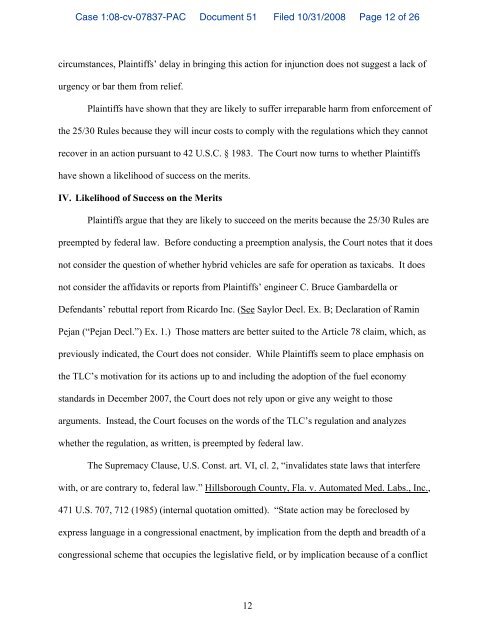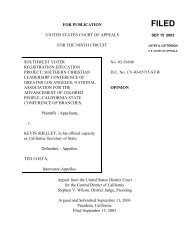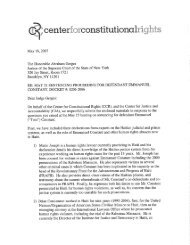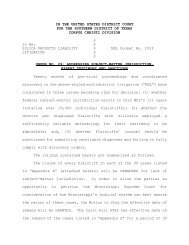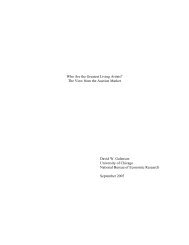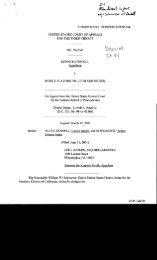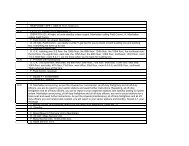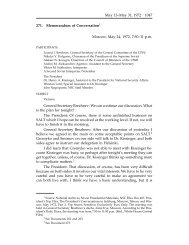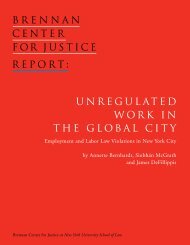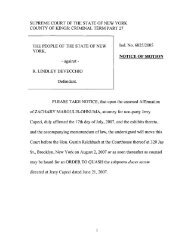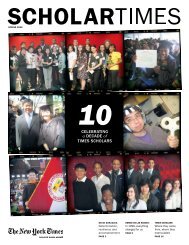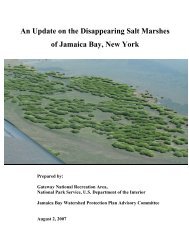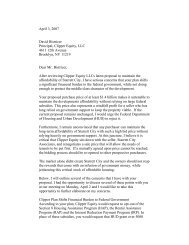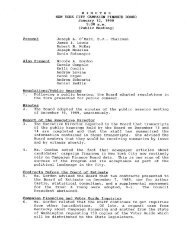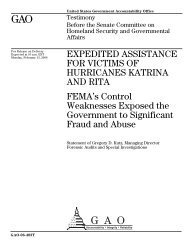UNITED STATES DISTRICT COURT SOUTHERN DISTRICT OF ...
UNITED STATES DISTRICT COURT SOUTHERN DISTRICT OF ...
UNITED STATES DISTRICT COURT SOUTHERN DISTRICT OF ...
Create successful ePaper yourself
Turn your PDF publications into a flip-book with our unique Google optimized e-Paper software.
Case 1:08-cv-07837-PAC Document 51 Filed 10/31/2008 Page 12 of 26<br />
circumstances, Plaintiffs’ delay in bringing this action for injunction does not suggest a lack of<br />
urgency or bar them from relief.<br />
Plaintiffs have shown that they are likely to suffer irreparable harm from enforcement of<br />
the 25/30 Rules because they will incur costs to comply with the regulations which they cannot<br />
recover in an action pursuant to 42 U.S.C. § 1983. The Court now turns to whether Plaintiffs<br />
have shown a likelihood of success on the merits.<br />
IV. Likelihood of Success on the Merits<br />
Plaintiffs argue that they are likely to succeed on the merits because the 25/30 Rules are<br />
preempted by federal law. Before conducting a preemption analysis, the Court notes that it does<br />
not consider the question of whether hybrid vehicles are safe for operation as taxicabs. It does<br />
not consider the affidavits or reports from Plaintiffs’ engineer C. Bruce Gambardella or<br />
Defendants’ rebuttal report from Ricardo Inc. (See Saylor Decl. Ex. B; Declaration of Ramin<br />
Pejan (“Pejan Decl.”) Ex. 1.) Those matters are better suited to the Article 78 claim, which, as<br />
previously indicated, the Court does not consider. While Plaintiffs seem to place emphasis on<br />
the TLC’s motivation for its actions up to and including the adoption of the fuel economy<br />
standards in December 2007, the Court does not rely upon or give any weight to those<br />
arguments. Instead, the Court focuses on the words of the TLC’s regulation and analyzes<br />
whether the regulation, as written, is preempted by federal law.<br />
The Supremacy Clause, U.S. Const. art. VI, cl. 2, “invalidates state laws that interfere<br />
with, or are contrary to, federal law.” Hillsborough County, Fla. v. Automated Med. Labs., Inc.,<br />
471 U.S. 707, 712 (1985) (internal quotation omitted). “State action may be foreclosed by<br />
express language in a congressional enactment, by implication from the depth and breadth of a<br />
congressional scheme that occupies the legislative field, or by implication because of a conflict<br />
12


